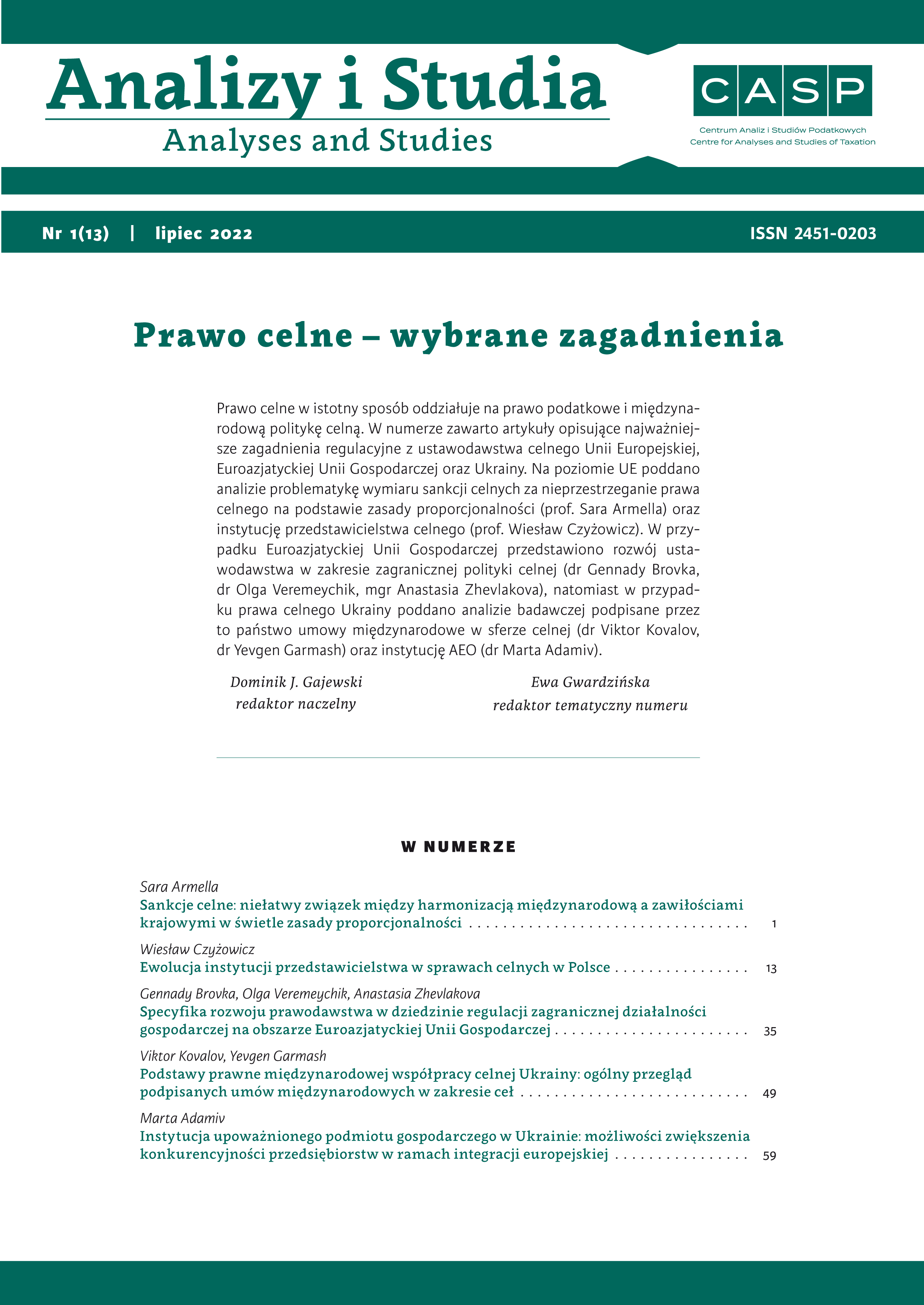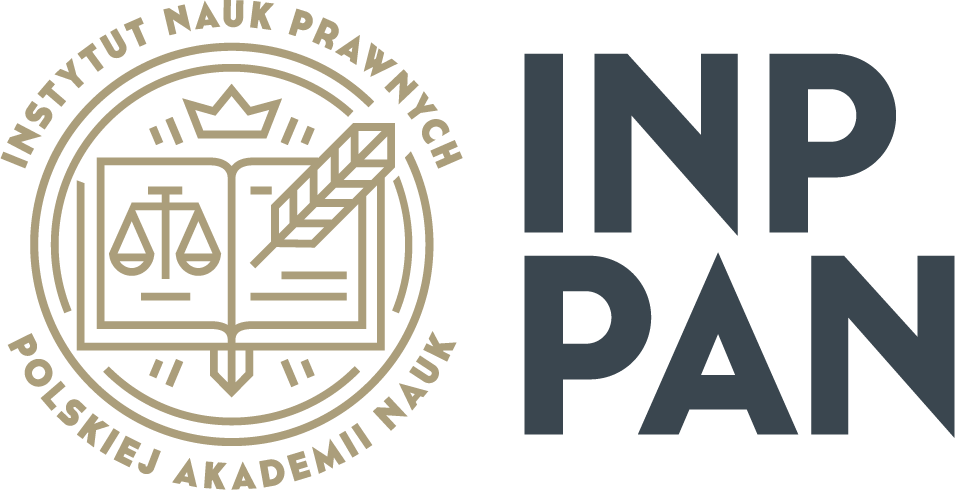Podstawy prawne międzynarodowej współpracy celnej Ukrainy: ogólny przegląd podpisanych umów międzynarodowych w zakresie ceł
DOI:
https://doi.org/10.33119/ASCASP.2022.1.4Słowa kluczowe:
międzynarodowe prawo celne, współpraca celna między Ukrainą a UE, konwencje międzynarodowe, organizacje międzynarodowe, traktaty międzynarodowe, umowy międzynarodoweAbstrakt
Podtrzymywanie międzynarodowej współpracy w zakresie spraw celnych państwa jest istotnym elementem polityki zagranicznej Ukrainy. Trwające reformy ukraińskiego systemu celnego oraz zmiany w prawie celnym w kontekście procesów integracji europejskiej rodzą potrzebę przeprowadzenia analizy zaangażowania krajowych organów celnych we współpracę międzynarodową. W związku z tym w artykule przeanalizowano główne przepisy regulujące współpracę celną między Ukrainą a UE, a także członkostwo Ukrainy
w głównych organizacjach międzynarodowych, stanowiące podstawowy bodziec do jej przystąpienia do umów międzynarodowych w sprawie upraszczania i harmonizacji krajowych procedur celnych. Z analiz tych płynie wniosek, iż obecnie w Ukrainie istnieją szczegółowe ramy regulacyjne umożliwiające krajowym organom celnym ustanawianie i utrzymywanie międzynarodowych stosunków celnych zarówno z zagranicznymi organami celnym, jak i z organizacjami międzynarodowymi, których ustawowe obowiązki obejmują działania na rzecz współpracy celnej.
Bibliografia
Babyuk, A.M. (2021), Legal regulation of customs in
Ukraine. Actual problems of state and law, tom 89, red.
G.I. Chanisheva. Odessa: Helvetica, s. 3–7.
Denisenko, S.I. (2020), International legal standards for
simplification and harmonization of customs procedures in the field of international trade, praca doktorska. Odessa: Ukraiński Państwowy Uniwersytet Finansów i Handlu Międzynarodowego.
Godiak, A.I., Ilyushik, O.M., Pavlovich-Seneta, J.P. (2019),
Customs law of Ukraine. Lwów: SPOLOM, s. 308.
Kolodiy, I.M. (2021), The impact of globalization on the
development of cooperation between states within the
World Customs Organization, Law Forum, 3, s. 147–153.
Kormych, B. (2018), The Customs Law of Ukraine. The Introduction to Ukrainian Law, Forthcoming, http://doi.
org/10.2139/ssrn.3166278.
Kostyshyn, Y. (2020), Conceptual principles of customs
control research, European Cooperation, 1(45), s. 51–62.
Kovalev, V.G., Garmash, E.V. (2021), Customs formalities,
customs procedures, Public Administration and Customs Administration, 4(27), s. 129–133.
Manzhar, K., Perkumienė, D., Beriozovas, O. (2021),
Ukraine and the WTO, Miškininkystė ir kraštotvarka.
Girionys (Kauno r.): Kauno miškų ir aplinkos inžinerijos kolegija, 1(19).
Muzhev, O.O. (2019), Theoretical and methodological
principles of customs policy implementation within the national economy, Biuletyn Naukowy Chersońskiego Uniwersytetu Państwowego, seria: Nauki ekonomiczne, 26, s. 193–196.
Sydor, H., Marynchak, L., Zelinska, H. (2021). Combating
violations of customs rules and smuggling, Biuletyn Naukowy Iwano-Frankiwskiego Narodowego Technicznego
Uniwersytetu Nafty i Gazu, seria: Ekonomia i zarządzanie w przemyśle naftowym i gazowym, 1(23), s. 137–148,
https://doi.org/10.31471/2409-0948-2021-1(23)-137-148.
Van Der Loo, G. (2016), The EU-Ukraine DCFTA. W: Legislative approximation and application of EU law in the
Eastern neighbourhood of the European Union, Van
Elsuwege P., Petrov R. (red.). Londyn: Routledge.
Voichenko, T. (2021). Organization of customs control:
European practices, Economy and Society, 33, https://
doi.org/10.32782/2524-0072/2021-33-1.
Akty prawne
Ustawa nr 117/94-VR w sprawie przystąpienia do Konwencji celnej dotyczącej międzynarodowego przewozu towarów z zastosowaniem karnetów TIR.
Ustawa nr 250-VI w sprawie ratyfikacji Protokołu przystąpienia Ukrainy do Światowej Organizacji Handlu.
Ustawa nr 699/2000 w sprawie przystąpienia do Konwencji o wzajemnej pomocy administracyjnej w zapobieganiu naruszeniom przepisów celnych oraz dochodzeniach w tym zakresie i eliminacji naruszeń
przepisów celnych.
Ustawa nr 995/472 w sprawie przystąpienia do Konwencji o odprawie czasowej.
Pobrania
Opublikowane
Jak cytować
Numer
Dział
Licencja
Autor (Autorzy) artykułu oświadcza, że przesłane opracowanie nie narusza praw autorskich osób trzecich. Wyraża zgodę na poddanie artykułu procedurze recenzji oraz dokonanie zmian redakcyjnych. Przenosi nieodpłatnie na Oficynę Wydawniczą SGH autorskie prawa majątkowe do utworu na polach eksploatacji wymienionych w art. 50 Ustawy z dnia 4 lutego 1994 r. o prawie autorskim i prawach pokrewnych – pod warunkiem, że praca została zaakceptowana do publikacji i opublikowana.
Oficyna Wydawnicza SGH posiada autorskie prawa majątkowe do wszystkich treści czasopisma. Zamieszczenie tekstu artykuły w repozytorium, na stronie domowej autora lub na innej stronie jest dozwolone o ile nie wiąże się z pozyskiwaniem korzyści majątkowych, a tekst wyposażony będzie w informacje źródłowe (w tym również tytuł, rok, numer i adres internetowy czasopisma).
Osoby zainteresowane komercyjnym wykorzystaniem zawartości czasopisma proszone są o kontakt z Redakcją.
Autor zgadza się na dalsze udostępnianie pracy wg wymagań licencji CC-BY-NC






















